My Cats Fur All Smell Funny
 Many people wonder "why does my cat smell?" now and then. Our pet kitties seem to spend hours every day washing, so we think of them as clean animals. However, sometimes they have a bad odor. Maybe they have always had it, or perhaps it is something more recent.
Many people wonder "why does my cat smell?" now and then. Our pet kitties seem to spend hours every day washing, so we think of them as clean animals. However, sometimes they have a bad odor. Maybe they have always had it, or perhaps it is something more recent.
While cat smells are often harmless, they can also be a sign of an underlying health problem, like bad teeth, an upset tummy, or kidney problems. In this article, we will look at why cats smell and show some of the ways you can stop it.
In response to some questions from our readers, we recently added some information, especially about cat anal glands smell.
- Why do cats smell
- The dirty litterbox
- Cat urine smells
- Bladder and kidney stones
- Cat ear smells
- Smelly cat fur
- Bad breath
- Ammonia breath in cat
- Cat anal glands smell
- Getting rid of smells
Don't forget – if you think it could be something serious, it's always worth reaching out to your vet.
My Cat Always Washes – Why Does She Smell?
We all know that cats are notoriously clean animals.
They constantly use their tongues to bathe themselves, and seem to pride themselves on keeping their coats glossy and sleek.
When they seem to spend half of the day grooming to keep their coats in perfect condition, it can be a surprise when you find that she's a bit stinky!
With all that cleaning, you simply wouldn't expect to smell a foul odor coming from your feline. Why do cats smell? What do I do if my cat suddenly smells bad?
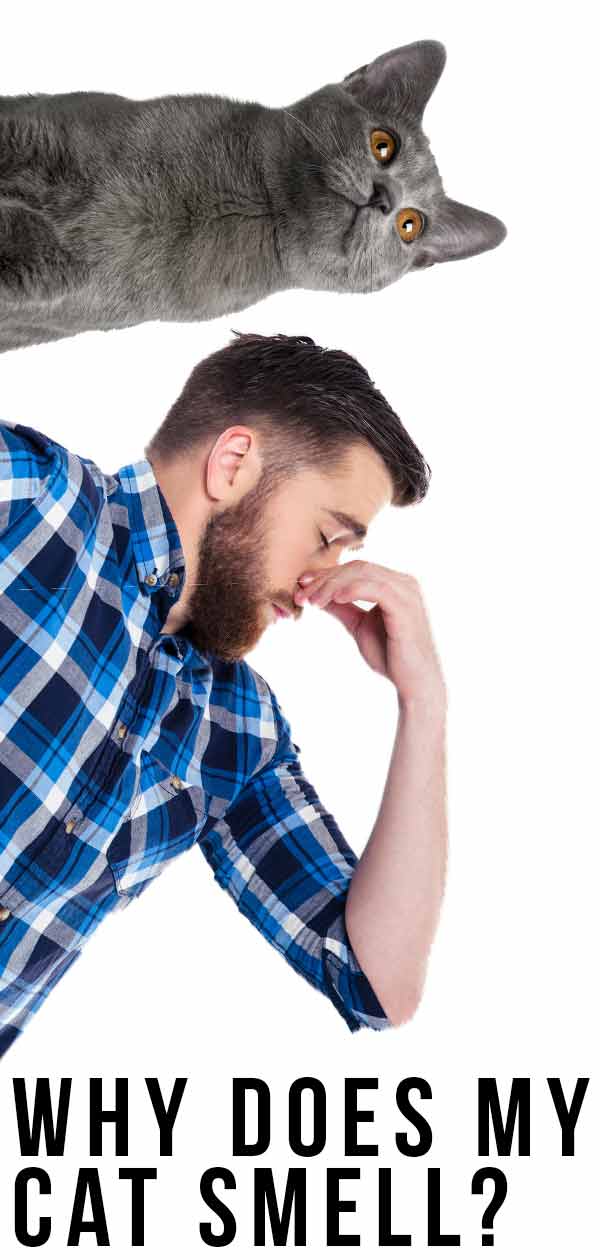
If you find yourself saying, "Pee-ew, I have one smelly cat", there may be quite a few different reasons for the smell.
In this article, we explore a few of the more common causes and help you figure out what you should do about it.
The most obvious place to start is with the kitty's litterbox. If you are wondering why your cat smells like poop, this is the most common source of bad smells and usually the easiest to fix!

Why Does My Cat Smell – Litterbox Smelling Issues
If you are wondering why does my cat smell, the first place to look is in his litter box.

- How To Give A Cat A Bath
If you find that the litterbox smells, you can stop this pretty easily.
Fortunately, litterboxes shouldn't smell if you take care of them properly. If you are slacking on cleaning, then you should definitely start here.
You should remove unpleasant kitty waste from boxes at least once a day, if not more. Ideally, you should replace cat litter at least once a week. If a cat's box is dirty, it might decide to toilet elsewhere, leaving you more mess to clean!
You could also try a different brand of litter. Some are more absorbent than others and lock away nasty smells. Others have a fragrance to mask odors, but don't use this as an excuse to neglect your cleaning.
Washing Cat Litterboxes
Washing the box weekly or every two weeks is always a good idea, too. Be careful to use fragrance-free dish soap to clean the box.
You can always use some of the disinfectants recommended for cleaning baby bottles, because they are mild. However, it's important to check any product with your vet, because some things safe for humans are toxic to cats.
Stay away from citrus smelling cleaners, because orange, lemon, lime, and grapefruit smells are too strong for a cat's delicate nose and they may shy away from the litterbox.
You can even buy self cleaning litterboxes like this one! Although, they do still require regular emptying.
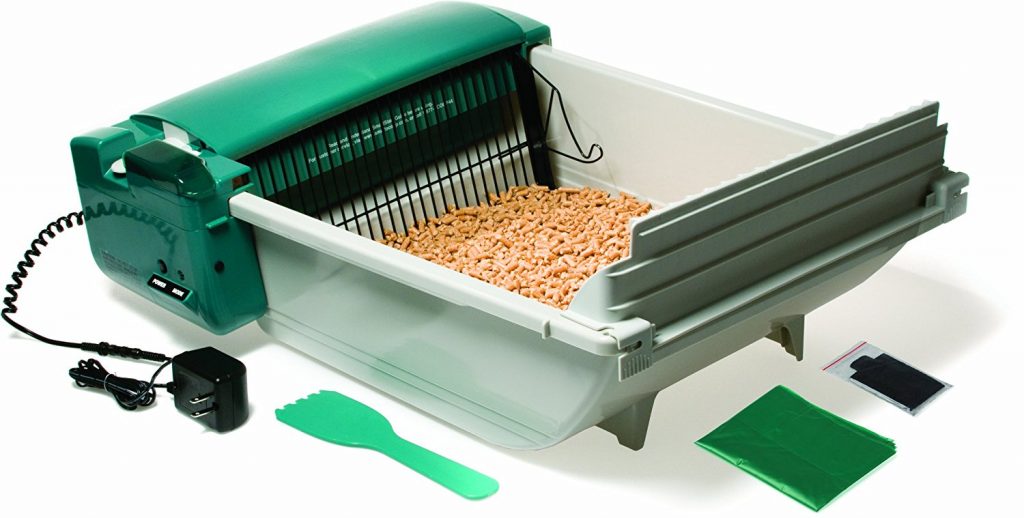
What if you are diligent about litter cleaning and you still get a strong whiff of ammonia when passing by the litterbox? This can be a sign that there is more urea in the cat urine than usual.
Cat Urine Smell
Urea is a digestive byproduct of protein, and urea levels are typically quite high in your feline's urine. This is because cats usually have very efficient kidneys from when their ancestors lived in hot climates.
However, you may detect a strong odor if the urea becomes even more concentrated than normal.
This often happens when there is little water passing through the kidneys to dilute the urine. In other words, your cat is probably a bit dehydrated.
It's really important to find out why and try to solve the problem.
Access To Water
Make sure to provide plenty of water for your feline. While many people choose to place water dishes next to food dishes, this might be a mistake. It might be why your cat is not drinking enough.
Cats in the wild are voracious hunters and eat the prey they kill.
However, they do not drink water near their hunting grounds, because the recently killed animal can contaminate the fluid.
These same instincts come into play inside your house, so make sure to set out a fresh water bowl a room or two over from the food dish.
Also, instincts tell cats that running water is cleaner and safer to drink. One of my cats would only drink water from a running faucet!
So consider investing in a kitty drinking fountain as well (they can even be kind of fun!)
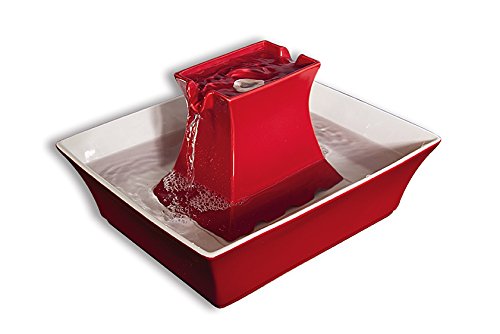
If the litterbox smell doesn't clear up in a day or so, why don't you give your veterinarian a call just to be on the safe side. It's always good to check that your cat doesn't have any kidney problems or bladder stones.
Here, perhaps we should explain what we mean by bladder stones.
Cat Bladder Stone Problems
Just like humans, cats can suffer from painful bladder stones. Unbelievably, bladder stones really are stones! They are small, hard mineral deposits that form in the bladder of your cat. Stones can be very small or they can grow to fractions of an inch in diameter.
Small or large, they can rub against the bladder wall and cause pain and discomfort. More seriously, these stones can block the urinary tract (urethra), making it difficult for your cat to pee. Stones can also form in the kidneys, with similar effects.
Bladder and kidney stones are one of the main reasons why your cat smells like urine.
What Are The Symptoms?
If you notice blood in your cat's urine, or your cat has difficulty urinating, licks his genitals, or urinates in strange places, these are just some of the symptoms of bladder stones. Their urine will be concentrated and smell strongly of ammonia.
These, and other symptoms, may suggest a kidney or bladder stone issue.
There are many causes, including a dry diet, lack of access to water, an infection of the urinary tract, and drug side effects. Some breeds are more prone that others, and males are more likely to suffer from a blocked urethra.
How well do you know your cat? Discover the secret world of cats.
The Happy Cat Handbook - A unique guide to understanding and enjoying your cat!

Additionally, kidney problems and the formation of stones can lead to your cat eliminating urine outside the litterbox. As a result, they may be the cause of the icky smell you are experiencing.
Treating Bladder Stones
If you have an elderly cat, then you may want to think about switching your cat from a dry food to a wet one. You can also get special biscuits designed to prevent stone build up, and your vet can suggest diets and medicines to help.
Not only does kidney function decrease as your furry friend becomes a senior kitty, but middle aged and elderly cats are more likely to develop kidney and bladder stones.
Wet food can add the moisture your cat needs, provide an abundance of healthy protein, and help to make the urine more acidic.
Research studies in urine composition show that acidic urine can reduce the formation of kidney and bladder stones.
Should I See A Vet?
Bladder stones can be very painful and distressing for your cat. To summarize, if you notice symptoms such as:
-
-
- lethargy
- blood in urine
- reduced appetite
- increased or decreased urine output
- vomiting
-
This will require a trip to a veterinarian for a complete assessment. If your cat's urine smells strong, maybe you could get it checked out!
If your cat does smell, how do you get rid of cat smell from your house?
What if urine isn't the cause? For example, cat's ears are often a cause of smells.
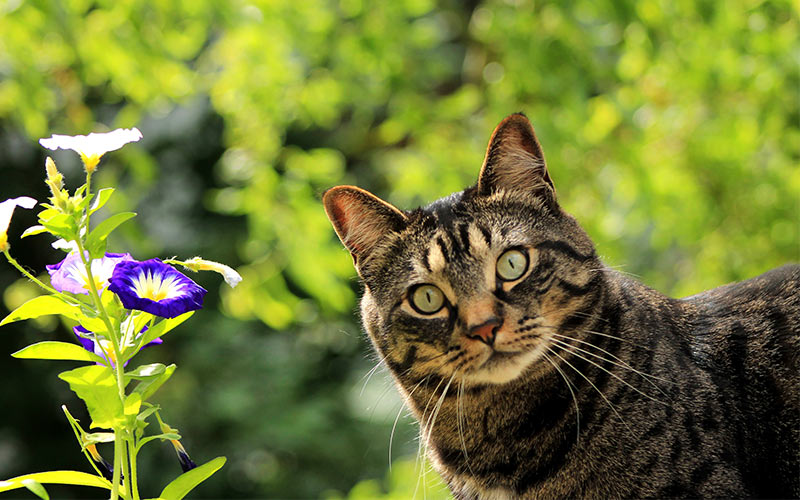
My Cat's Ears Smell
Have you scoured your cat's litterbox and searched your carpet for signs of stains and smells without much luck? Do you still want to know why does my cat smell?
Well, it may be your kitty's body that is stinky. If your nose detects a foul ear odor, then you have probably found the source of the smell. Cat's ear smells can be a sign of other health problems.
Cat ear infections are common, and the strong odor will typically be musty or yeasty.
If you think the odor reminds you of a freshly poured mug of beer, you are not imagining things. The culprit is yeast.
Yeast infections can occur on their own when the fungal microorganism, Malassezia pachydermatis, grows in both the ear canal and around the folds of the inner ear.
Like humans, cats produce earwax to help clean and protect the ears from bacteria and yeast.
However, certain problems can lead to yeast and bacteria becoming trapped in the ear canal. When the microorganisms multiply, an infection develops.
If you have a child, then you may be very familiar with ear infections. Well, cats develop the same sort of problem! Yeast infections are usually why your cat's ear smells.
Cat Ear Infections And Yeast
Cat yeast infections can occur even if a cat's ears are clean and relatively wax free.
Some cats are allergic or sensitive to Malassezia pachydermatis. The sensitivity causes ear inflammation, which traps the yeast and causes an infection.
This can lead to a recurrent issue that is extremely frustrating for both you and your smelly cat.
The good news is that research shows promising results with a dual yeast infection treatment method.
The method involves antibacterial and anti-fungal medications.
Speak with your veterinarian about this. Your kitty companion will thank you!
Cat Smelly Ear Treatment
Yeast infection treatments are helpful and the best course of action for any pet parent. But a straightforward approach is sometimes not enough, because yeast infections may be secondary infections.
If you have ever developed a sinus infection right after a cold, you know exactly what we mean by a secondary infection. The cold virus means that bacteria can get stuck in the sinuses, and an infection develops.
Secondary ear infections may be caused by allergies (yes, your furry feline may have seasonal allergies just like you!) or trauma (like when your cat has a scratching fit and accidentally claws part of the ear).
Did you know that thousands of research papers have been published on cat behavior and health? No time to read them all? Don't worry - we've done it for you! And picked out the best bits! The Happy Cat Handbook - A unique guide to understanding and enjoying your cat!

Parasites like ear mites can cause the problem too. In addition, so can hormone fluctuations, pieces of plants, or other foreign matter stuck in the ears. Other causes include immune deficiencies or medicine side effects. If you see what looks like coffee grounds or bits of dried blood all around the inner ear, then this is probably the issue.
A Trip To The Vet
If your cat has ear problems and smelly ears, your veterinarian will need to complete the examination to find the cause.
A simple physical examination may be all that is needed, especially if a parasitic infection is present. Sometimes, the treatment can be as simple as a course of antibiotics, spot-on remedies that attack ear mites, or ear drops.
When the symptoms are not so "in your face" as a parasite issue, your vet might take some blood samples.
Once a treatment plan is worked out, secondary ear infections should be a thing of the past for your smelly cat.
Next, let's narrow this down further and deal with stinky cat fur.
My Cat's Fur Smells
So you've sniffed your smelly cat, and you can't find a specific source for the unpleasant odor.
Does your cat's fur smell? If it does, yeast may be the troublemaker again.
However, the smell is probably coming from the skin, and not the fur itself. The same type or microorganism that causes ear problems, Malassezia pachydermatis, is the problem here too.
If a skin yeast infection is present, then you may see yellow or brown flaking skin. You might be able to see the skin quite clearly too, especially since alopecia, or hair loss, is one common symptom of the infection.
When it comes to the skin, once again, the issue is probably a secondary infection.
Fleas and food allergies are common culprits, and so are specific skin allergies to products you use in the home. In some cases, your feline may have a serious disease like cancer or a tumor condition.
This is one reason why it always wise to seek out assistance from your veterinarian, even if the problem seems straightforward. Older cats and longhaired breeds are particularly prone to secondary skin infections, so pay special attention.
Older Cats and Longhaired Cats
If you have an older cat, skin infections can be due to poor cleaning habits. If your cat is arthritic or overweight, she might not be able to reach some parts of her body. If she can't clean her rear end, that will explain why your cat smells like poop!
Longhaired cats are prone to matting and skin infections, and you may have to start giving your kitty a bath. Some owners even take their cat for a trim, especially during hot summers!
Check out this great guide to find out how to bathe your kitty.
Now, if it isn't the litterbox, it isn't the ears, and it isn't the skin, what is causing the stench. The next cause on our handy list is cat bad breath.
My Cat's Breath Smells
You have ruled out the other issues, but you still want to know, 'why does my cat smell?' Certainly, cat bad breath is one more thing to consider. Cat's bad breath smells can be very unpleasant, and you might wonder why cat breath smells like fish. If you are unlucky, yourcat breath smells like rotten meat!
Your cat's breath certainly will not smell as fresh as a spring daisy, because they eat meat. However, when bad breath in cats smells far worse than the can of food you set down at mealtime, then the issue may be a more serious one.
A few problems can cause bad breath. Bacteria, gum disease, or dental issues are the main causes of cat halitosis.
Cats have incredibly dirty mouths containing a plethora of bacteria. For example, bacteria, like Pasteurella multocida, are responsible for causing infections in humans after a cat bite.
Studies show that these bacteria can lead to septic shock in humans and other animals. For cats, hundreds of other strains of bacteria that are present in the mouth can easily infect the gums and cause bad breath.
In some cases, the bacteria can cause gum and tooth abscesses as well. The most serious infections smell quite bad and may emit an odor that is reminiscent of rotting flesh or pus.
Red and swollen gums are a sign of an infection, so you should take your cat to vet for a check, where they may clean the teeth or even extract any problematic teeth. Unfortunately for your cat, dental cleaning and dental extractions may be necessary.
Sometimes, the smell from your cat's mouth may be nothing to do with her teeth. If you smell ammonia, read on!
Ammonia Cat Breath Issues
If the odor you notice smells like ammonia, then your cat possibly has a uremic fetor problem.
This odd sounding issue is quite troublesome, and it is caused by the salivary breakdown of urea.
If you scroll back just a bit to the beginning of this article, then you know we have already discussed urea when talking about urine.
You might ask, 'what the heck is urea doing in the mouth?'
Well, it is caused by poor kidney function and the buildup of urea in the blood. The condition can be a sign of kidney failure, so you should visit the vet as soon as possible. Your cat might require emergency intervention if his breath smells of urine.
While kidneys are the main culprit, a bladder stone lodged in the urethra can cause this problem too.
Both of these issues are serious and need immediate care. Your cat could need surgery, hemodialysis, long-term dietary changes, and/or fluid increases.
Anal Glands My Cat's Butt Smells
Many mammals, cats included, have anal glands, which they use for marking their territory and leaving messages for other cats when they defecate. If your cat smells musky, his anal glands are usually to blame.
Most of the time, you won't notice them. However, if they become blocked, you may notice a strong and unpleasant musky odor emanating from your cat's rear end. It's one of the most common reasons why your cat's butt smells.
Sometimes, they may leak if your cat is frightened or stressed, or they can become infected and blocked.
If you think this is the case, it might be wise to take kitty to the vet for an examination. They might treat the infection or manually 'express' the blocked glands. Your vet will also check that there are no serious problems like tumors.
If your cat keeps on having problems, your vet might recommend losing weight or giving him a high fiber diet.
Anyway, we have looked at some of the causes of bad cat smells. Once you have treated the problem, how can you get rid of cat smell from your house.
How To Get The Cat Smell Out Of The House
A sick kitty or a smelly litterbox can leave your house smelling a bit foul.
Once you find the problem and the solution, it is time to get the smell out of your home. There are a number of ways you can do this.
Cat Spraying – Get Rid Of Cat Smell
If you notice your furry friend spraying in the house, it is useful to get rid of the smell as quickly as possible or they will keep on doing it in the same place.
Spraying difficulties can be stopped by neutering your cat, although you should be aware that this is not a definite cure.
If a cat does spray, using the regular detergent you use for washing clothes can be a great way of getting rid of the smell. The Cat Vet has some useful tips:
-
- Decontamination: Get rid of most of the spray
- Washing Detergent: Biological, enzymatic washing detergent, the stuff you user for cleaning clothes, will break down the fat in the urine
- Surgical Spirit: This can break down stubborn fat, although be careful. Apart from being flammable, surgical spirit can damage fabrics and paint
- Stain Remover: A stain remover spray can remove the staining and odor
- Break Habits: Try to keep cats away from the area for a while
- Be Thorough: Don't skimp on the cleaning, because the slightest residue means that your cats may try to do it again.
That seems like a lot of work, especially if your cats spray a lot, so commercial cleaners can help.
Commercial Cleaning Products For Cat Urine
Cleaning cat spray can be quite a difficult task. You may already know this if you feverishly scrub the carpets on a weekly basis.
Your best option to remove urine odors is to use an enzymatic cleaner.
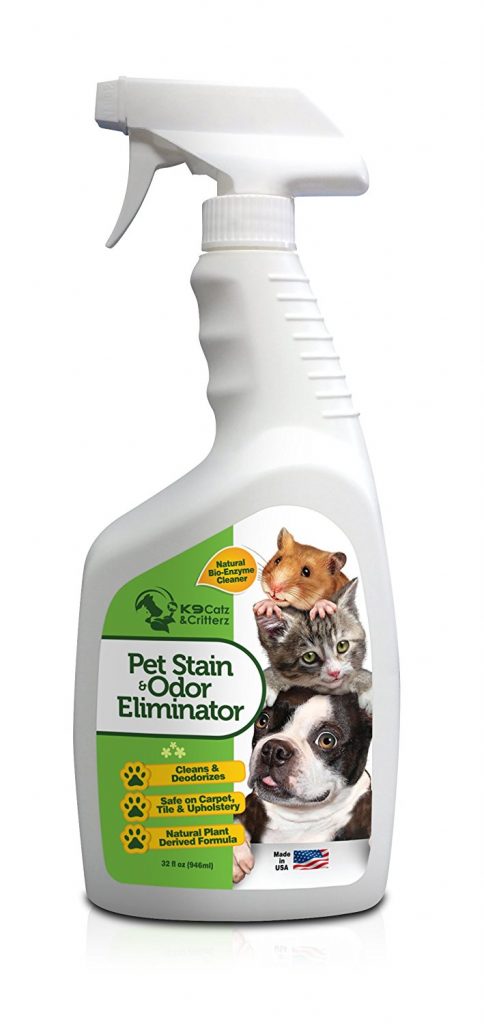
There are many commercial cleaners on the market, and while they do not offer a magic solution to odor and stain removal, they do a good job of getting rid of the stinky urine smells.
The products contain proteins and bacteria that work together to break down the organic compounds in the urine, such as urea.
The key to using an enzymatic cleaner is to spray a generous quantity on all cat stains and to allow the fluid to sit for at least 15 minutes.

Blot the area afterwards, allow it to dry, and inspect it. If the stain and the smell remain, apply the cleaner again.
Extractive cleaning machines that use hot, high pressure water can be helpful in removing smells and stains from carpeting and upholstery too.
Also, remember how we talked about cats not liking citrus smells. A citrus cleaner or cat deterrent can help you stop that. As always, check that any cleaning products are cat-friendly and safe.
Why Does My Cat Smell? – A Conclusion
We have outlined a few of the stinkiest and most common cat odor issues in this article, which we updated this year with some new and interesting information.
Now, you can hopefully answer the question, 'why does my cat smell bad?'
The types of odors that make you say, "Ick, what did my cat eat today," are just part of having a fur-baby, but some smells do require veterinary assistance, and dare we say, a dreaded bath.
Odors can strike at any time, so make sure to be prepared with your smelling salts and try to take a closer look at the problem.
Your cat will thank you, even if your nose does not.
Do you have some funny cat odor smells to share, or do you deal with a stinky cat that passes gas just a little too often?
Why not let us know with a quick comment below or even share some funny stinky cat stories.
Other Fun Cat Facts
If you wanna find out more about our favorite feline friends, we've got some really interesting articles!
What interesting cat facts will you learn?
- Do Male Cats Have Nipples?
- Why Does My Cat Knead Me?
- Cat Love Bites – Why Do They Do That?
References
Guillermo J. Amador, David L. Hu, Cleanliness is next to godliness: mechanisms for staying clean, Journal of Experimental Biology 2015 218: 3164-3174; doi: 10.1242/jeb.103937
H. Cottam, P. Caley, S. Wamberg, and W. H. Hendriks
Feline Reference Values for Urine Composition
J. Nutr. June 2002 132: 1754S-1756S
Kidney Stones In Cats
Ordeix L1, Galeotti F, Scarampella F, Dedola C, Bardagí M, Romano E, Fondati A, Malassezia spp. overgrowth in allergic cats, Vet Dermatol. 2007 Oct;18(5):316-23
Niyati Narsana author and Faria Farhat, Septic shock due to Pasteurella multocida bacteremia: a case report, J Med Case Rep. 2015; 9: 159
Your Amazing Cat!

We are so excited to share our new book with you!
If you have enjoyed your visit to The Happy Cat Site we think you'll love The Happy Cat Handbook.
Written by the founders of this website including the author of the hugely successful Happy Puppy Handbook, it's packed with cat care information and fascinating cat facts.
Grab your copy today!
holifieldlinto1976.blogspot.com
Source: https://www.thehappycatsite.com/cat-smell/
Post a Comment for "My Cats Fur All Smell Funny"